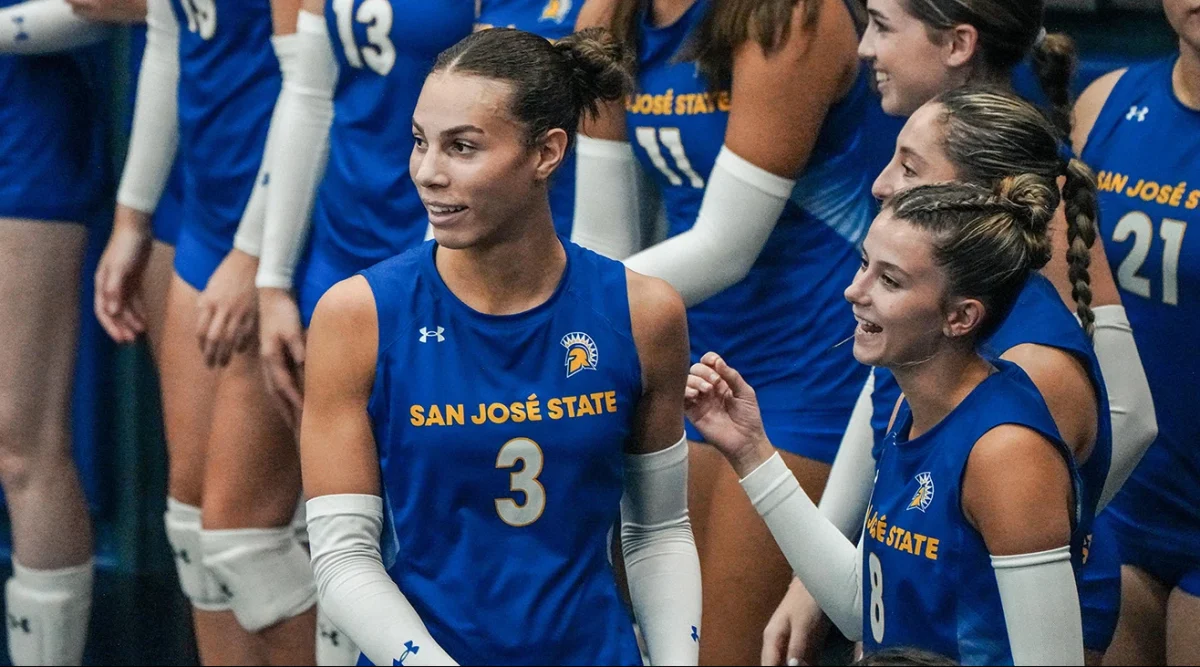How would you feel if you had to compete and share a locker room with the opposite gender in your Division I sport?
To protect the safety and ethical integrity of women’s sports, transgender athletes who are biologically male, should not be permitted to compete in women’s sports.
In the past month, five girls’ Division I collegiate volleyball teams forfeited against San José State University because of a transgender athlete, Blaire Fleming, being a prominent starting player. Utah State University, University of Wyoming, Boise State University, Southern Utah University and the University of Nevada, Reno are all amongst the teams that have recently fortified games against SJSU.
“We, the University of Nevada, Reno women’s volleyball team, forfeit against San José State University and stand united in solidarity with the volleyball teams of Southern Utah University, Boise State University, the University of Wyoming and Utah State University,” the girls volleyball team from the University of Nevada, Reno said in an exclusive statement to Outkick.
The teams are standing up for women’s rights in sports against a biological male. The women on these teams are fighting for female empowerment and rights in sports by forfeiting the games. After all of the hard work put into their careers, it is important to focus on the women in women’s sports.
Fleming, a 6’1” outside hitter, identifies as a transgender female. Fleming has played at SJSU since 2022. Previously, she played at Coastal Carolina University in 2020.
Fleming transferred to SJSU after South Carolina passed Bill 4608, an anti-transgender bill that prohibits transgender students from participating in school sports in middle school, high school, and college. Consequently, Fleming would be banned from playing on her college volleyball team, justifying her transfer to SJSU.
The National Collegiate Athletics Association permits transgender athletes to compete on women’s sports teams according to ncaa.org. The NCAA uses the policy that aligns transgender student-athlete participation with the Olympic Movement. In 2022, the NCAA Board of Governors updated the transgender student-athlete participation policy governing college sports.
However, teams and transgender athletes must follow certain conditions and proper documentation.
“The athlete has declared that her gender identity is female,” the International Olympic Committee said. “The declaration cannot be changed, for sporting purposes, for a minimum of four years. The athlete must demonstrate that her total testosterone level in serum has been below 10 nmol/L for at least 12 months before her first competition.”
Upon their transfer, Fleming was not known to be transgender by her teammates and other players in the conference.
Even Flemings’s teammate and roommate, Brooke Slusser, claims that “she had no idea she’d be competing and rooming with a male athlete on her women’s volleyball team” according to Outkick.
Flemings’s gender was claimed to be covered up by the SJSU Athletic Department and hidden by the school’s volleyball program. In an interview with Outkick, Slusser explained how no one was notified about Fleming and they were left blindsided.
“This was a well-kept secret by the SJSU athletic department,” Outkick said. “Until it wasn’t. In April, reports surfaced that Blaire Fleming, a 6-foot-1 outside hitter for the Spartans, was born a male.”
Slusser discussed the current situations in her program, what the coaches demanded the women to do, and how to act accordingly for the situation.
“When that first article came out, it was quite literally just a media meeting talking about, ‘Don’t make comments. If media people come up to you, it’s not your story to tell,'” Slusser said.
The women felt silenced as their voices were taken away from them.
“And that was it,” Slusser said. “It wasn’t, ‘How do we feel about this? Are we okay?’ It was how to handle the media and not make it look like there’s a problem, and almost just the feeling of just sweeping it under the rug, and that was it.”
The women on the team felt hurt as their trust in the school and the volleyball program, which they so strongly believed in, was shattered.
“It was more so the school only supported Blaire, and they didn’t seem to want to check in on us,” Slusser said. “Basically, ‘You shouldn’t be the person to identify Blaire’s gender identity. That’s something that Blaire needs to do, and not you. That’s not your story to tell.’ But we all have a story, too.”
But Blaire wasn’t the only one experiencing this. The entire team had to experience it. They had many conflicting emotions and expressions about the current situation, but they were not able to voice them.
“And that was it,” Slusser told Outkick. “It wasn’t, ‘How do we feel about this? Are we okay? It was how to handle the media without making it look like a problem. [It was] just [swept] under the rug, and that was it.”
They felt betrayed and overlooked in a situation that was not at all concerned about how they felt, it was all about Fleming.
Slusser took matters into her own hands and decided that what was going on in her program was not fair in women’s sports. This led to Slusser’s current involvement in a lawsuit with several current and former athletes, including NCAA Division I swimmers, Riley Gaines, Reka Gyorgy, Kylee Alons, and Kaitlynn Wheeler are suing the National Collegiate Athletics Association for letting transgender athletes compete against them and use female locker rooms in college sports.
The lawsuit was started by Gaines, a Division I swimmer from the University of Kentucky, battling to remove transgender athletes in women’s sports.
Slusser continues to applaud teams that have stood up against Fleming and the SJSU girl’s volleyball team.
Although Slusser is receiving negative feedback from her peers and the media, she believes that she is doing the right thing and must stand up for her own beliefs and the equality in women’s sports.
“It is so much bigger than just me and the now,” Slusser said.
Every forfeit against SJSU, and the transgender athlete on their team, is a sign of women standing up for what is right and fighting for fairness and equality of women in women’s sports. Each voice is valuable and proving to the NCAA that they are allowing them to compete is unfair and needs to change.
There are many arguments regarding the current situation. One of the most prominent is that Fleming is not even that skilled at volleyball as she plays on a low-ranked team whose record was low last year. Thus, Fleming should “deserve to stay on the team and continue to play.”
The media is arguing that Fleming is not even one of the best players women’s volleyball has ever seen. Although this is true, it does not change the fact that Fleming is a biological male.
In 2022, when Lia Thomas, a biological male, won an NCAA championship for swimming, the argument was certainly not “she is not even that good.”
So, why is the skill level of an athlete even relevant and arguable in a situation like this? The relevance of the dominance of a transgender athlete in women’s athletics is beside the point.
The facts are that a biological man is taking away an opportunity, a position from one of the women should not be acceptable, no matter how fast they can swim or how hard they can hit a volleyball.
None of these women on the teams are forfeiting against Fleming. The women are questioning the NCAA and the fact that the organization would even allow this situation to happen in the first place.
Over the past century, women were told that their rights are insignificant and that their dreams or aspirations are not important. They were told to put their heads down and do what was told of them. Now, women are finally standing up for their rights in sports.
Now, they stand up together united saying, enough is enough.
The facts are clear, Fleming is a biological male who identifies as a transgender woman and is taking away opportunities from biological women who deserve to compete in the position.
Fleming’s skills at the sport are irrelevant to this argument and by participating in a women’s sport they are jeopardizing the integrity of women’s sports as a whole and the athlete’s careers. It is not fair to the rest of the women who are competing. It is not fair for women to play against a man who is proven to be physically stronger with an entirely different demeanor.
Outkick reporter, Charly Arnolt, spoke on behalf of the women who have forfeited SJSU.
“I’ve spoken to women who have forfeited against Fleming and their message is almost universal: they are not mad at Blaire Fleming, and they are not protesting Fleming,” Outkick said. “They are protesting the rule makers that allow biological males to compete in women’s sports.”








Jack W Huttig • Nov 13, 2024 at 10:28 am
Is Blaire Fleming post-op? In all the reporting on this story, no one has said if she has completed gender reassignment surgery.
Viktoria Kiss • Nov 14, 2024 at 1:51 pm
Hi, Thanks for your question.
The NCAA permits transgender athletes to compete on women’s sports teams according to ncaa.org. A transgender athlete competing in the NCAA are required to follow certain policies and regulations that align transgender student-athlete participation with the Olympic Movement. They are not allowed to release Fleming’s medical records for privacy and medical record confidentiality.